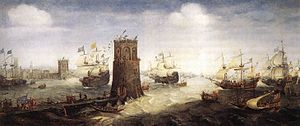
Image: The Crusaders' maritime charge against the Tower of Damietta, Egypt
The main enemy of a string of Crusader kingdoms spread along the coast of Palestine was the Mamluk Sultanate based in Egypt. The Fifth Crusade was spearheaded against the hostile power in hope to wrest control of the Holy Land.
The stalemate stirred unjustified hopes for the global assault against the Muslim world. King David, Prester John's successor, was destined to play one of the leading roles in this campaign. The following extract describes the confused ambiance prevaling among the Crusaders who pinned their hopes on a non-existent savior:
"After yielding Jerusalem to Salah
ad-Din, better known in the West as Saladin, in the wake of the battle of
Hattin, the Latin dominion in the Outremer was reduced to a narrow coastal
strip stretching from Jaffa to Antioch. The costly enterprise was in constant
jeopardy of extinction. Full of determination to turn the tide in the permanent
confrontation with Islam and restore the Christian sway over the Holy City, the
pope summoned the Lateran Council to proclaim a fresh crusade.
The bloody military engagements of
the Fifth Crusade pitted the motley host gathered from diverse parts of Europe
against the standing army of the sultan of Egypt assisted by his royal
brothers, the rulers of Syria and Mesopotamia.
One of the most acute problems of
this Crusade was the lack of the charismatic leader who could tame the
indomitable energy of rank-and-file warriors and guide them to carry out the
Mission Impossible of conquering Egypt.
The participants were waiting to no
avail for the arrival of the ultimate commander-in-chief, the potentate of the
Holy Roman Empire Frederick. For lack of the better, the crusaders agreed to
nominate King John of Jerusalem, who was
put in charge of the siege of Damietta, a bustling port in the Nile Delta and
the gateway to Egypt. A shrewd political leader, the monarch understood that
there were not enough troops under his command to subdue the land of the pyramids,
which became the transit goal of the occupation force.
Engaged in the games of honor, the
elite commanders would hang their troops in abeyance rather than in action. Meanwhile,
famine and pestilence, ravages of weather and hostile attacks took a heavy toll
on common fighters.
This bout of inactivity put the
invading host at low ebb. Jacque de Vitry, the bishop of Acre and one of the
crucial propagandists of the Crusade, recalls that most of the participants
"were in the grip of despair." (41) Besides, the number of fighting
troops would melt in a seasonal Ferris Wheel of arrivals and withdrawals since
the sum of quitters had far surpassed the stock of newcomers. The papal fury
reached white heat and a handful of the departing leaders were excommunicated.
The Crusaders’ initial task was to
seize Damietta, a river port city perched between the eastern branch of the
Nile and a lake, with the year-round access to the Mediterranean. The
attackers, who became bogged down in a blockade over the enemy stronghold, were
disturbed by occasional bites of the sultan’s relief army. In addition, local
pirates endeavored to cut the maritime supply line serving the occupant troops.
The routine of this humdrum existence was
interrupted by the arrival of the papal legate Pelagius, who was tossed in the
still water like a heavy rock. Those who stood for a fast advance received
reinforcement in the person of this energetic bishop who became the guiding
spirit of the Fifth Crusade."